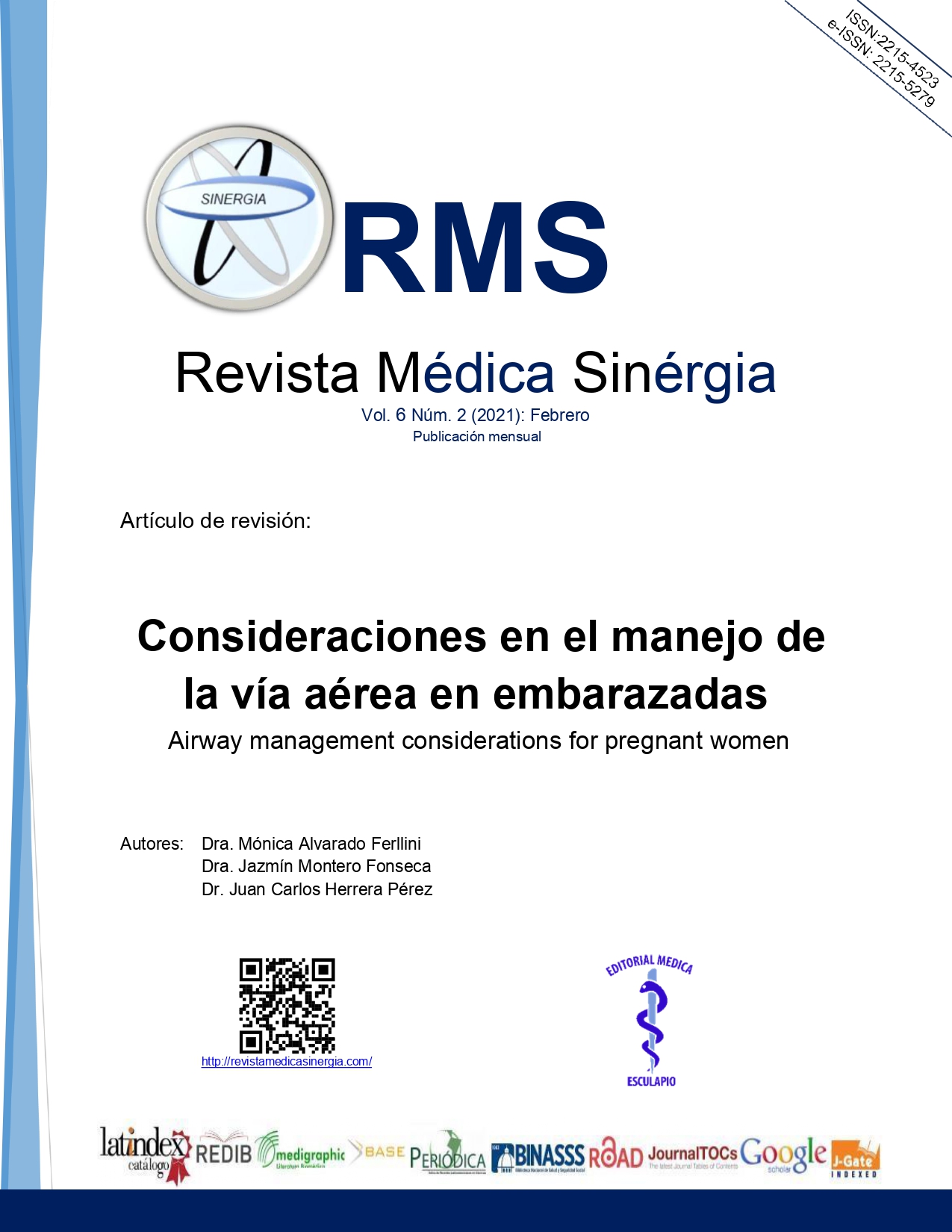Abstract
The anatomy and physiology of pregnant women undergoes changes in most systems of the body, but some of the most significant changes are those that occur at the respiratory level, which make obstetric patients a potential difficult airway. This should be identified by a complete airway evaluation prior to manipulation, as it is done in non-pregnant patients. After this assessment, it is necessary to apply the algorithms that have been designed to orientate the management of ventilation and intubation in this type of patient, for example, the guidelines published by Obstetric Anaesthetists’ Association and Difficult Airway Society, always with the intention of preserving the maximum maternal and fetal welfare.
Keywords
References
Einav S, Weiniger CF, Landau R, editors. Principles and Practice of Maternal Critical Care. Switzerland: Springer; 2020.
Mushambi MC, Athanassoglou V, Kinsella SM. Anticipated difficult airway during obstetric general anaesthesia: narrative literature review and management recommendations. Anaesthesia. 2020; 75: 945-961. https://doi.org/10.1111/anae.15007
Mushambi MC, Kinsella SM, Popat M, Swales H, Ramaswamy KK, Winton AL, et al. Obstetric Anaesthetists’ Association and Difficult Airway Society guidelines for the management of difficult and failed tracheal intubation in obstetrics. Anaesthesia. 2015 Nov; 70(11):1286-306. https://doi.org/10.1111/anae.13260.
Ramírez C, Rivera R, Tovar L. Claves para el manejo de la vía aérea en la embarazada. Rev Mex Anest. 2016; 39(1): 64-70.
Singhal V. Chapter 40: Pregnancy. In: Prabhakar H, editor. Essentials of Neuroanesthesia. London: Elsevier; 2017. p.669-680.
Alanoğlu Z, Erkoç SK, Güçlü ÇY, Meço BC, Baytaş V, Can ÖS, et al. Challenges of obstetric anesthesia: difficult laryngeal visualization. Acta Clin Croat. 2016 Mar; 55(1): 68-72. https://doi.org/10.20471/acc.2016.55.s1.09
Bennet TA, Katz VL, Zelop CM. Cardiac Arrest and Resuscitation Unique to Pregnancy. Obstet Gynecol Clin N Am. 2016 Dec; 43(4): 809–819. http://dx.doi.org/10.1016/j.ogc.2016.07.011
Crozier TME. General Care of the Pregnant Patient in the Intensive Care Unit. Semin Respir Crit Care Med. 2017; 38: 208–217. https://doi.org/10.1055/s-0037-1600905
Roshan F, Phillips S. El Manejo de la Intubación traqueal difícil y/o fallida en anestesia obstétrica. Rev Chil Anest. 2016; 45(1): 16-26. https://doi.org/10.25237/revchilanestv45n01.02
Butterworth JF, Mackey DC, Wasnik JD. Morgan & Mikhail’s Clinical Anesthesiology. United States: McGraw-Hill; 2018.
Lambertus TE, Gómez B, Ottenwalder M. Protocolo de atención para el manejo de la vía aérea difícil [Internet]. República Dominicana: Ministerio de Salud Pública; 2017 [citado 2020 Dic 28]. Disponible en: https://repositorio.msp.gob.do/handle/123456789/932
Lapinsky S. Management of Acute Respiratory Failure in Pregnancy. Semin Respir Crit Care Med. 2017; 38: 201–207. https://doi.org/10.1055/s-0037-1600909
Maeda A, Fujita N, Nagasaka Y. Respiratory and Airway Considerations in Obstetric Patients. Current Anesthesiology Reports. 2019; 9: 48-54. https://doi.org/10.1007/s40140-019-00309-0
McGuire B, Lucas DN. Planning the obstetric airway. Anaesthesia. 2020; 75(7): 852-855. https://doi.org/10.1111/anae.14987
Metodiev Y, Mushambi M. Supraglottic airway devices for Caesarean delivery under general anaesthesia: for all, for none, or for some?. Br J Anaesth. 2020; 125(1): e7-e11. https://doi.org/10.1016/j.bja.2020.02.012
Ramkumar V, Dinesh E, Shetty SR, Kundra P, Das S, Myatra SM, et al. All India Difficult Airway Association 2016 guidelines for the management of unanticipated difficult tracheal intubation in obstetrics. Indian J Anaesth 2016; 60:899-905. https://doi.org/10.4103/0019-5049.195482
Rojas A, Balkenhol M, Herrera O, Opazo M, Hernández M, Rivera M. Síndrome de Hallermann-Streiff y embarazo: manejo de la vía aérea difícil en embarazadas. Rev Chil Obstet Ginecol. 2016; 81(3): 223-228. http://dx.doi.org/10.4067/S0717-75262016000300009
Alvarado M. Secuencia de intubación rápida en el Servicio de Emergencias: una revisión bibliográfica. Revista de la Facultad de Medicina
de la Universidad de lberoamérica. 2020; 3(2): 1-9.

This work is licensed under a Creative Commons Attribution-NonCommercial 4.0 International License.
Copyright (c) 2021 Array


